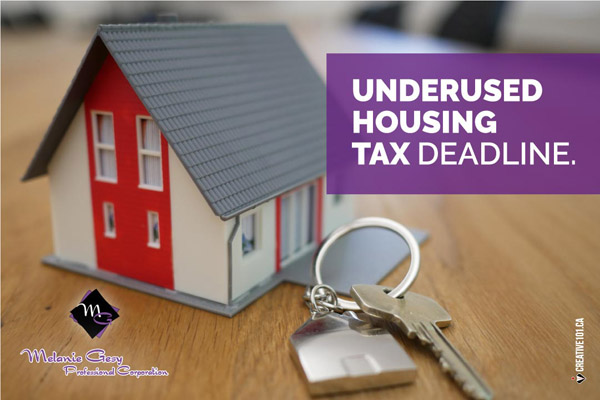MELANIE GESY NEWS

The Underused Housing Tax Deadline has been Extended.
Does it apply to you?
What is the Underused Housing Tax?
The Underused Housing Tax (UHT) is an annual federal 1% tax on the ownership of vacant or underused housing in Canada. The tax generally applies to non-residents of Canada that are owners of housing in Canada. However, in some situations, this tax also applies to some Canadian owners (such as certain partners, trustees, and corporations).
Deadline is April 30 every year however, the government has extended it to October 31 for this year only.
Penalties and interest
If you fail to file the return on time, you'll incur penalties.
Individual $5,000
Corporation $10,000
About the UHT
Introduced in 2022, the Canadian Underused Housing Tax Act is a vital piece of legislation aimed at encouraging property owners to make more efficient use of their residential properties. Its primary goals are to combat housing shortages and improve housing affordability by reducing the number of vacant or underutilized homes.
Here are some key elements of the Act:
- Annual Declarations: Property owners are required to declare the status of their residential properties each year. This declaration helps determine if the property is vacant, underused, or their primary residence.
- Vacant Property Tax: Owners of vacant homes for a significant portion of the year may be subject to a vacant property tax. Specific criteria and tax rates vary by province.
- Underused Property Tax: If a property is deemed underused, meaning it is not fully utilized for its intended purpose, the owner may also face an underused property tax.
Preparing for October 31st
To ensure compliance with the Canadian Underused Housing Tax Act and meet the October 31st deadline, property owners can take several proactive steps:
- Review the Act: Familiarize yourself with the Act's provisions to understand your obligations and potential tax liabilities.
- Gather Documentation: Gather all necessary documents and information to accurately complete your declaration, such as property usage records, lease agreements, and occupancy details.
- Seek Professional Advice: If you're uncertain about your property's status or the tax implications, consider consulting a tax professional or legal advisor.
- Submit Your Declaration: Ensure that you submit your annual declaration on time through the designated government portal or channels.
As the October 31st deadline for compliance with the Canadian Underused Housing Tax Act approaches, property owners in Canada should prioritize understanding and meeting their obligations under this legislation. By doing so, they not only avoid potential penalties but also contribute to the larger goal of addressing the housing crisis and improving housing affordability in the country. Stay informed, be proactive, and meet the deadline to ensure a smooth and legally compliant property ownership experience.
For complete details, visit the Canada Revenue's website here.

